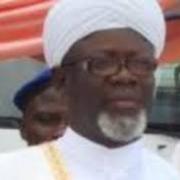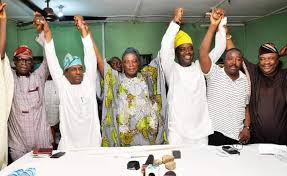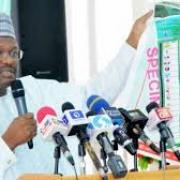Independent National Electoral Commission
-
Nigeria does not need more than Five Political Parties-Prof. Olagoke
- By solomon2day
- On 11/02/2020
- In Special Report
 The Independent National Electoral Commission(INEC) has de-registered 74 out of the 92 political parties in Nigeria.
The Independent National Electoral Commission(INEC) has de-registered 74 out of the 92 political parties in Nigeria.The Inter party Advisory Council(IPAC) insists that the INEC’s action is at variance with the rule of law, while insisting that Nigerians have since lost confidence in the electoral body.
However, a sizable number of Nigerians argue that INEC ought not to have registered such a high number of political parties in the first instance,just as they also opine that INEC is only playing out a script written by its paymaster.
In this interview, the Founder, Spiritual Head and Grand Imam of Shafaudeen-in-Islam Worldwide, Prof. Sabitu Olagoke insists that Nigeria only need five political parties to ensure national unity. Excerpts :
Do you think INEC is right to have de-registered 74 out of the 92 political parties in Nigeria ?
The decision of INEC that led to the de-registration of 74 out of the 92 political parties in the country is a scenario of relieving the electoral process of been too cumbersome. Ab initio, Nigerians are divided over the outrageous number of registered political parties which in the last general elections made the exercise to be worrisome, misleading and embarrassingly made the ballot paper unnecessarily colorful and artistically confusing. It made some voters to become mere robotic objects relying on the remote control of some vote merchants.
A critical assessment of the 92 political parties raised some questions that probed into how some people got their certificates in school.
When one compares the performances of such graduates in their places of work to their activities in the wider society, the credibility of the universities which awarded the certificates would be at stake.
The INEC now has to prove its capability and credibility to de-register what it earlier approved because some schools of thought are of the opinion that the de-registered political parties are victims of circumstances because they have every right to exist even without impact of the society, provided they did not turn their parties into violent or terrorist groups.
However, a critical look into the competence test for parties already registered was based on their performances in the 2019 general elections. On this account the affected parties failed to meet the requirements of the INEC.
On a scale of fairness, Nigerians cannot confidently say that those who triumphed actually won the elections justly. The challenge before all of us is on how to tackle the issue of vote buying and the highest bidder syndrome, campaign expenses limit compliance and internal party Democracy to choose the right and popular candidate, rather than those who are imposed. This category are aided by crooked means to win elections.
The de-registration of 74 political parties would have been a good riddance, if not for the fact that there are still pending applications of the registration of political parties with INEC.
Nigerian politicians and the political parties have had a negative impact on the economic and security well being of the nation, when one considers our situation of death without war and destitution in the midst of plenty.
This is so because the existing political parties were not established to salvage the cause of the country, but for the participants to have their own share of the national cake, with a very good opportunity to loot the treasury and earn special packages as salaries, bonuses and allowances.
This is why the rat race by politicians to get into positions of power threw the Holy Bible into the ocean and the Holy Koran into the lagoon and in the process shunning all cultural values of integrity to toil with the lives of Nigerians who they are supposed to work for and to deplete the resources of the land at the expense of the people’s welfare and national development.
Our political parties small or big, are bereft of ideological goals and one can hardly differentiate, in terms of values, one from the other.
Politicians in Nigeria live three lives, when not yet in government they brand themselves as our messiah, when in government they resort to self-enrichment, build egos and castles around themselves to become untouchable, while presenting administration as one for the most difficult and complex Mathematics to solve through protocols and bureaucratic means, using the media to their advantage.
When they are in opposition they play the holier than thou script and pretend as if they are ready to fight for the masses, the whole exercise is to pull down perceived enemies.
In these three lifestyles none is exemplary and the truth about Nigerian politicians is that of unpatriotic elements, who only scavenge about to accumulate wealth.
Nigeria would be better off, when our religious systems focus on the emancipation of humanity and our politicians, who claim to be products of this socio-divine substance would be able to uphold the concept of sacrifice in service, selfless service to others through the principles of philanthropy.
When political parties are formed through algebraic equations of the democrat on the one hand and the conservative on the other, the ideological goal would be to evolve, while voters would be able to identify with the kind of lifestyles they desire for the nation in the next four years of the new political dispensation which may extend to another four years of grace willingly by the people who may want to appreciate beneficial good governance from party A or party B. Suffice it to now say that political parties performances and impact in the positive direction needs to dwell on respecting people’s fundamental human rights to all good things of life, including education, health, infrastructure and employment, in an atmosphere of the promotion of inclusive society.
Good governance in which everybody benefits through a people oriented political party is far better than the proliferation of political parties in which many of them would become mere buffer solutions for the bigger ones to win elections.
Nigeria does not need more than five political parties, each of these political parties must respect religious differences, ethnic and tribal spread in the country and in the general geographical contraption to promote the unity of the country.
In terms of population strength and geographical spread therefore, a party of national status is needed with distinct ideological goal to market itself.
The voters themselves would be able to identify lairs among them, this is because in a situation in which oppressors dominate a party, people must not expect development, zero tolerance to corruption, but institutional discipline that usually promote agitation, impoverishment and man made security challenges such as terrorism, kidnapping and banditry.
The INEC should therefore make use of the National Orientation Agency(NOA) and the Media to sensitize Nigerians on the need for the five political parties that would be competitive enough to address the issues of fundamental human rights and inclusiveness, to be able to achieve in the area of good governance, while the INEC itself need to strategically put up an electoral process that would be free of abuse, but fair and just, in order that Nigeria is able to have in place a good government.
-
We Formed Alliance to Free Oyo from External Influence-ADC,PDP,ZLP AND SDP
- By solomon2day
- On 06/03/2019
- In News
 The four political parties that formed an alliance in Oyo state have attributed their decision to the urgent need to liberate the state from overbearing external influence.
The four political parties that formed an alliance in Oyo state have attributed their decision to the urgent need to liberate the state from overbearing external influence.The position of the political parties is contained in a statement titled ''An Alliance for the Freedom of Oyo state'', signed by Chief Senator Oulfemi Lanlehin of the African Democratic Congress(ADC), Engr. Oluseyi Makinde of the Peoples Democratic Party(PDP), Barr. Sharafadeen Alli of the Zenith Labour Party(ZLP) and Chief Bolaji Ayorinde of the Social Democratic Party(SDP).
''We must reverse the situation where all our resources are filtered away to external forces. We have therefore decided that in order to present an effective and workable solution to the unpalatable situation where Oyo state has been remotely controlled for the past 8 years by outside forces and all manner of constituted authority, there is the need to form this alliance of political parties in the state''.
'' We have firmly resolved to present one candidate in the person of Engineer Oluseyi Makinde of the Peoples Democratic Party for the office of the Governor at the elections holding on 9th March 2019. He shall be heading by the special grace of God and the power of the people of Oyo state, a Government of Unity which will cater for the interest of all our people irrespective of Political Association''.
''In the interest of our thriving Democracy, we have also resolved that the House of Assembly elections will be contested on party basis and all candidates in all the parties are encouraged to go to the polls and contest for the seats available in the Oyo state House of Assembly as scheduled''.''We urge and encourage our people to reject the All Progressives Congress(APC) in the state and its candidates in the state at the election and vote for our Freedom and Emancipation'', the statement concluded.
-
Oyo INEC Bars People Reporter from Covering General Elections
- By solomon2day
- On 14/02/2019
- In News
 The Independent National Election(INEC) in Oyo state has barred the reporter of an online investigative news platform People (2day.emyspot.com) from covering the Presidential, NationalAssembly and Governorship elections in the state .
The Independent National Election(INEC) in Oyo state has barred the reporter of an online investigative news platform People (2day.emyspot.com) from covering the Presidential, NationalAssembly and Governorship elections in the state .Prior to its decision, it had informed journalists in a Media Briefing it held recently, that media organizations wishing to cover the general elections had only a day to submit a letter from their organizations and two passport photographs of their staff wishing to cover the elections within 24 hours.
Surprisingly, an INEC official in the state office, told the affected reporter that ''your application was not approved'', even though INEC never gave any instruction to media organization to submit applications.
Interestingly, in a news report on Thursday, by 12 noon , in the Oyo state owned Broadcasting Corportation(BCOS), the television station's reporter, reported that INEC in the state received about 600 applications from media organizations, but only had media kits for 251 journalists. 251 reporters to cover elections in Oyo state alone ?
Sadly, in past elections,the state office of INEC had given accreditation to individuals who do not have any business in journalism, to cover the elections, for purposes that were at variance with the conduct of free, fair and credible elections.
